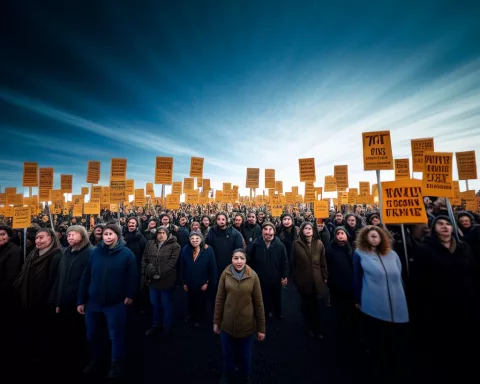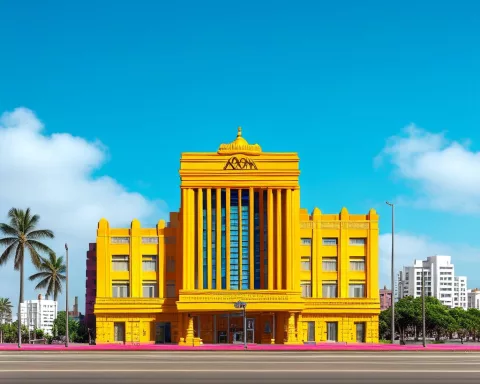Labor movements in South Africa, especially COSATU, are powerful forces fighting for fairness and rights for workers. On October 7, 2024, they staged a big national strike, calling attention to problems like unemployment and corruption, and demanding better jobs and working conditions. The streets of Cape Town buzzed with energy as diverse groups came together, waving colorful banners and chanting for change. This event was not just about one day; it was a continuation of a long history of struggle for justice, inspiring hope for a brighter future where everyone can thrive.
What is the significance of labor movements in South Africa?
Labor movements in South Africa, particularly COSATU, play a crucial role in advocating for economic and social justice. Their recent national strike highlighted key issues like unemployment, collective bargaining rights, and corruption, while also pushing for essential labor reforms and sustainable development to ensure a fairer society.
A Historic Stand for Justice
In the vibrant tapestry of South Africa’s history, labor movements have asserted their presence with determination and tenacity, significantly influencing the nation’s socio-political terrain. On October 7, 2024, the Congress of South African Trade Unions (COSATU) staged a pivotal national strike, voicing demands for economic and social justice. This demonstration underscored COSATU’s steadfast dedication to tackling urgent issues like unemployment, poverty, and income inequality. While rooted in the historic pursuit of workers’ rights, this modern movement also addressed contemporary economic challenges, blending historical awareness with forward-thinking strategies.
As the first light of day touched Cape Town, an unmistakable energy surged through its streets. Protestors began to gather on Hanover Street, near the Cape Peninsula University of Technology (CPUT), with their sights set on the Western Cape Government’s offices, including the Provincial Legislature and the National Parliament. The marchers, representing diverse backgrounds, mirrored the complex tapestry of South Africa’s working class. Their vibrant banners and placards conveyed a unified vision for a fair society.
COSATU’s strike manifesto was comprehensive, addressing various grievances. Central to their demands was the cessation of attacks on collective bargaining—a fundamental right for workers across different sectors. This call resonated with similar global struggles as workers strive to maintain their negotiating power amidst shifting economic landscapes. Their plea to combat crime and corruption struck a chord, echoing widespread frustration with systemic issues that undermine public trust and stall economic progress.
Economic Challenges and Labor Reform
Integral to the strike was the protest against rising living costs and high unemployment rates. These economic challenges have left deep scars on South Africa’s landscape, fueling growing dissatisfaction among its citizens. The call for “decent jobs” was not merely about employment but also about securing dignified work that offers a living wage and respects workers’ rights. This aligns with a broader international demand for labor reforms that prioritize human dignity over profit margins.
Another critical focus of COSATU’s demands was the swift implementation of the Zondo Commission’s recommendations. This judicial inquiry, which investigated state capture, corruption, and fraud in the public sector during the presidency of Jacob Zuma, has become a beacon of hope for reform-focused citizens. COSATU’s insistence on adopting these recommendations highlighted its commitment to transparency and accountability in government operations.
Reflecting on COSATU’s history reveals its roots in anti-apartheid activism. Founded in 1985, the union quickly emerged as a powerful opponent of racial and economic oppression. Its integral role in the broader liberation movement solidified its status as a key player in South Africa’s transition to democracy. The October 2024 strike was not an isolated event but a continuation of a legacy of resistance and advocacy for social justice.
Striving for Equity and Sustainable Development
The strike also called for the end of austerity measures that many believe worsen social inequities by prioritizing fiscal consolidation over essential public investment. This perspective echoed criticisms from economists advocating for more progressive approaches to economic recovery. COSATU pushed for government negotiations on labor law reforms, emphasizing the need for collaboration between businesses and policymakers to forge a path toward sustainable development.
Organizing the strike required meticulous planning. COSATU ensured the protest’s legality by notifying the National Economic Development and Labour Council (NEDLAC) well in advance. This strategic move safeguarded the strike’s legitimacy, allowing participants to express their concerns without fearing legal repercussions. By involving NEDLAC, COSATU demonstrated its commitment to institutional engagement while challenging existing norms.
As the march unfolded, the streets became a vibrant stage for collective expression. Chants echoed off buildings, a rhythmic chorus of voices united in purpose. Anecdotal accounts from the day captured the spirit of camaraderie and determination permeating the ranks of protestors. Participants, ranging from seasoned activists to eager newcomers, shared their stories, weaving personal narratives into the larger movement’s fabric.
Resonating Impact of Collective Action
The potential for disruption loomed over the day’s events. Authorities and businesses braced for interruptions in daily activities, from public services to healthcare and air travel. This anticipation highlighted the strike’s power as a tool for social change, compelling society to recognize and address its workforce’s grievances.
Reflecting on the art of protest, intriguing parallels emerge with historical and artistic movements. Similar to the Impressionists, who challenged traditional techniques to capture the essence of modern life, COSATU’s strike sought to redefine the dialogue around economic justice. It invited South Africans to view the labor market through a lens of empathy and equity, envisioning a future unclouded by past injustices.
In the grand symphony of South Africa’s socio-political landscape, the national strike of October 7, 2024, played a powerful note. It reminded the nation—and the world—of the ongoing struggle for dignity and justice within the workplace. This event marked not only a specific day in history but also a continuum of advocacy that echoes through time, inspiring future generations to carry forward the torch of equity and reform.
FAQ: Unveiling the Power of Labor Movements in South Africa
What are labor movements in South Africa?
Labor movements in South Africa, particularly the Congress of South African Trade Unions (COSATU), are organized efforts aimed at advocating for workers’ rights and social justice. These movements address critical issues such as unemployment, corruption, and collective bargaining rights, playing a vital role in the socio-political landscape of the country.
Why was the national strike on October 7, 2024, significant?
The national strike on October 7, 2024, was significant as it brought together diverse groups of workers to demand economic and social justice. The event highlighted urgent issues like high unemployment rates, rising living costs, and the necessity for labor reforms, showcasing the collective power of workers in advocating for their rights and improving working conditions.
What key issues did COSATU address during the strike?
During the strike, COSATU addressed several key issues, including the cessation of attacks on collective bargaining rights, the fight against crime and corruption, the need for decent jobs that provide a living wage, and the implementation of the Zondo Commission’s recommendations to combat systemic corruption in government.
How do labor movements in South Africa connect to historic struggles for justice?
Labor movements in South Africa are deeply rooted in the country’s anti-apartheid activism and have played a crucial role in the broader liberation movement. Founded in 1985, COSATU emerged as a powerful opponent of racial and economic oppression, and its continuous advocacy for workers’ rights reflects a legacy of struggle for justice and equality in South Africa.
What impact did the October 2024 strike have on public perception and policy?
The October 2024 strike had a significant impact on public perception by raising awareness of the ongoing struggles that workers face and the need for systemic reforms. It compelled authorities and businesses to acknowledge and address the grievances of the workforce, potentially influencing future policy discussions related to labor rights and economic justice.
How does COSATU ensure the legality and organization of strikes?
COSATU ensures the legality and organization of strikes by notifying the National Economic Development and Labour Council (NEDLAC) well in advance. This strategic approach safeguards the strike’s legitimacy, allowing participants to express their concerns without legal repercussions, while also demonstrating COSATU’s commitment to engaging with institutional frameworks for social dialogue.












